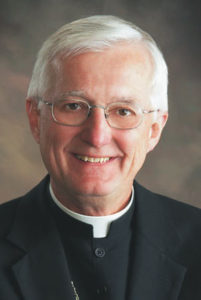
Dear Sisters and Brothers in Christ,
There is a ritual moment at Mass when the deacon (or priest, if there is no deacon) adds a drop of water into the chalice of wine, saying:
By the mystery of this water and wine
may we come to share in the divinity of Christ
who humbled himself to share in our humanity.
Since this is said quietly, often while the rest of us are singing, the action can go unnoticed; but it is profound in its simplicity. In fact, it is Christmas in a nutshell.
Our celebration of Christmas is all about the two-fold movement that these words express.
Yes, Christ humbled himself, and became one of us, as the great hymn in Paul’s letter to the Philippians proclaims (Phil 2:5-11).
The crèche, the carols and the decorations at this time of year all remind us of this awesome mystery, the mystery of the Incarnation, of a God who loves us enough to become one of us.
Before such a mystery we are invited to contemplate in awe, like the shepherds; to raise our voices in thanksgiving, like the angelic choirs; to fall down in worship, like the Magi.
But that’s not all. What can become lost in the celebration of the Child’s birth is the second part of the story: God became human so we could become like God; so we might share in the divinity of Christ, in the very life of the Trinity.
Christmas reminds us not just that Christ came to save us but even more so that Christ came that we might share divine life with him, to become like him.
And that is truly an unparalleled Christmas present!
Cristo vino a salvarnos
Queridos Hermanos y Hermanas en Cristo,
Hay un momento en el ritual de la Misa, cuando el diácono (o sacerdote, sino hubiera diácono) añadiendo algunas gotas de agua al vino que hay en el cáliz, dice:
Por el misterio de esta agua y de este vino
podamos llegar a compartir en la Divinidad de Cristo
quien se humilló así mismo, para com partir con nosotros nuestra humanidad
Mientras todos están mayormente cantando, se dice esta oración en silencio, por eso, pasa muchas veces sin ser advertida; pero es una oración muy profunda en su simplicidad. De hecho, es la expresión de la Navidad envuelta en nuestros ojos.
Nuestra celebración de la Navidad tiene que ver con este doble significado que estas palabras expresan.
Sí, Cristo se humilló así mismo y se hizo uno de nosotros, tal como lo dice el himno que escribió Pablo en su carta a los Filipenses (Fil. 2, 5-11).
El Nacimiento, los villancicos y las decoraciones en esta época del año, nos recuerdan sobre este Misterio, el Misterio de la Encarnación, de un Dios quien nos ama tanto como para hacerse uno de nosotros.
Delante de tal misterio, somos invitados a contemplar con admiración, tal como lo hicieron los pastores; a levantar nuestras voces en acción de gracias, tal como lo hicieron el coro de los ángeles; caer arrodillados en adoración, como lo hicieron los reyes magos.
Pero eso no es todo. Lo que puede perderse en la celebración del nacimiento del Niño es la segunda parte de la historia: Dios se hizo hombre para que pudiéramos llegar a ser como Dios, para que pudiéramos participar de la divinidad de Cristo, en la vida misma de la Trinidad.
La Navidad nos recuerda no sólo que Cristo vino a salvarnos, sino más aún, que Cristo vino para que podamos compartir la vida divina con él, llegar a ser como él.
¡Y eso realmente es un incomparable regalo de Navidad!
Sincerely in Christ,
Sinceramente en Cristo,
Most Rev. Martin Amos
Mons. Martin Amos
Bishop of Davenport
Obispo de Davenport







